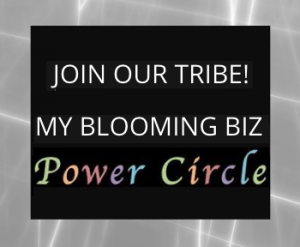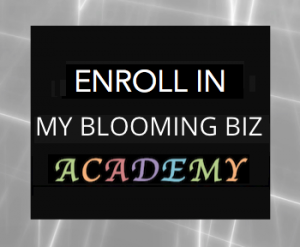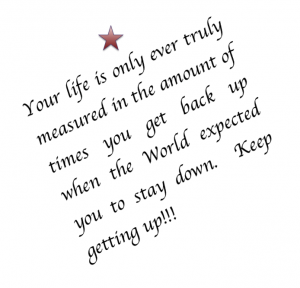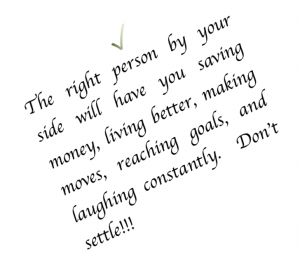Procrastination left unchecked will become habitual, and allowing your procrastination to become habitual is dangerous as it will delay your progress, and inevitably keep you stagnant. Since the mind operates on neural pathways that it carves out over the course of months and years of repetitious behavior, when procrastination is a habit, it’s hard to break. However, when a person is
committed enough to do something, they will get it done in spite of obstacles.
“Procrastination is opportunity’s assassin.” — Victor Klam
So, how do you stop procrastinating and start making progress?
Here are 7 Ways to Stop Procrastination in its Track So You Can Achieve Your Goals
1. Ensure the Goal is Something You are Passionate About
When you are in pursuit of something you are passionate about, you are usually enthusiastic about achieving it, and thus more likely to do what it takes to accomplish it. Take for example, your dream of owning a home in a particular neighborhood, you would first take time out to visit the neighborhood, then research houses that are for sale, check the processes as well as the cost range for the houses, and then continue to work on the requirements – regardless of any obstacles. You would think about this everyday, and
take consistent steps towards your goal of achieving it, because you are passionate about it.
At this point you already have your why for wanting a home as well as for wanting it in that particular neighborhood. And so, if you are ever faced with obstacles,
this passion and your why will keep you in hot pursuit of your dream home. If the goal is not something you are passionate about, then it will be 10 times harder to continue pursuing it.
2. Create Clearly Defined Goals with Milestones
In a recent post entitled,
How to Ensure You Achieve your Goals in Life, we talked about a three-part method to setting goals through active goal setting rather than passive goal setting which is the key functionality of the SMART goal model.
When you actively set your goals, and you write them out on paper or type them on a keyboard on a device, you send a visceral signal to your brain. You’re telling your brain clearly and concisely what you want, why you want it, and when you want it by.
This is one of the most important steps to setting goals that many people simply overlook. When you do not write things down, and you merely leave your goals in your mind as some obscure abstracts, it tells your mind that you’re not only not serious about those goals, but that you haven’t envisioned them enough to put them on paper. When they are on paper, they’re real. There’s a real date that you’re aiming to accomplish those goals by, you understand exactly what it is you’re trying to accomplish, and you know why you’re doing it.
So, the first way to stop procrastinating so you can accomplish your goals, is to understand exactly what you want and
why you want it. Then, when you know what you’re aiming for, you can break those goals down into milestones. You can take your one-year goals, break them down into months, weeks, and even days. Then, things become more manageable and achievable. You know what you have to do today, and you don’t get overwhelmed with the enormity of a huge goal.
3. Utilize the Quadrant System for Time Management
Most people procrastinate because of poor time management.
When you cannot manage your time properly, then it becomes hard to get ahead because you are using your time to do the things that are not directly connected to your goal achievement, and by the time you are through there is no time left to do those things that truly matter to your goal accomplishment. The more you fall behind, the harder it will be to catch up, and before you know it, that procrastination becomes habitual and the pattern becomes harder and harder to break. So, you need to institute some time management skills in order to create the best scenario that will allow you to follow through, and not become another victim of procrastination.
“What is important is seldom urgent and what is urgent is seldom important.” – Dwight Eisenhower
In his book,
The 7 Habits of Highly Effective People, Stephen R. Covey – building on Eisenhower’s words – created the Time Management Quadrant System which he explained at length. According to Stephen, there are 4 quadrants, but the one to spend the most time in, is quadrant 2 which deals with the substantive parts of our lives such as building relationships, writing personal mission statements, long-range planning, exercising, preventive maintenance, preparation – all those things we know we need to do, but somehow seldom get around to doing.
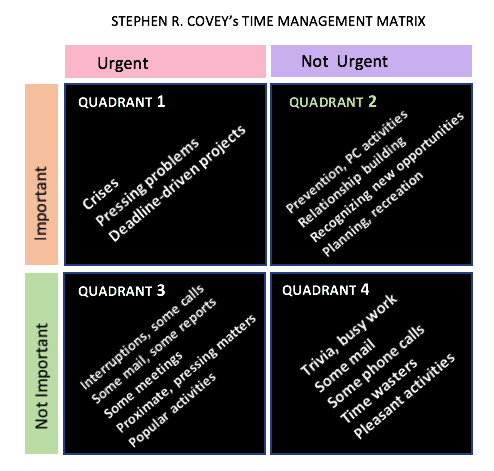
So, how does time management apply to procrastination?
When you manage your time wisely, that will ensure you do the things that directly contributes to your goal achievement. When you look at your goals and your milestones, you can break your day out into activities. Now, this applies to your free time; if you work a full-time job, then that’s a block of time you cannot skip over. However, when you do have free time, you can break out what you do into any of the four quadrants. Plan your day, so you can write the quadrant that each activity you have to do falls under.
So, the way to tackle procrastination is to ensure that you do the not urgent but important activities first, followed by the urgent and important. Quadrants 3 and 4 should occupy the least amount of your time. If you’re not doing anything towards your long-term goal on a daly basis, then you are increasing the time it will take to accomplish your goal as well as lessening the chance of you ever getting to it. Remember, procrastination becomes a habit, and habits are difficult to break.
4. Implement the 15-Minute Rule
According to health and wellness coach Caroline Buchanan, doing an activity for 15 minutes, and committing only to that block of time, helps to get over the hurdle of procrastination. The concept is that generally when someone does something for 15 minutes, they usually continue doing it for much longer, and by only committing to 15 minutes, you are helping to overcome one of the biggest hurdles in your mind, which simply involves getting started. Get a timer – use your phone, a stop watch, or a clock that you have handy. It has to be something that can count down the time, and place it in front of you. Set the timer to 15 minutes. Then, start doing the activity that you’ve been putting off and commit to doing it for 15 minutes. Try this and come back here and let us know, “What happened when the time ran out?”
5. Keep Your Body, Mind, and Spirit Sharp and Optimized
When pursuing your goals you have to ensure your mind, body and spirit are in tip top shape in order to have the best possible scenario of ensuring success. Eat healthy foods to heighten your energy instead of foods that make you sluggish. Exercise your body, which also rejuvenates the mind.
Get ample amount of sleep so your mind and body can be well rested and recharged to tackle whatever phase or hurdle you are in, in your pursuit. Meditate, go for walks, swim,
read a book, get together with family and friends, or even
volunteer in order to feed your spirit.
6. Change Your Environment
Patterns are developed through environmental cues. For example, when we’re at home, we run a certain set of behaviors that our mind has become accustomed to running but when we can break that pattern and change our environment, we can change our behavior. So, if you always find yourself jumping on the couch, grabbing the television remote, and turning on the television when you know you should be working on your goal, change your environment.
Take your laptop to a coffee shop or grab a notepad and pencil and head out to a park and sit on a bench. You will find that changing your environment can be one of the best ways to break the habits that have formed over time. So, if being in a particular environment is not empowering you to work on your long-term goals, go somewhere else and do it.
7. Locate and Enlist an Accountability Partner
The last method for eliminating procrastination in your life is to find an accountability partner. Accountability partnerships work when they are a collaboration between two colleagues who like and respect one another — your partner is someone you trust, who will keep you honest and moving on a path you set for yourself. For example, if the goal involves getting to the gym 3 days per week, then having an accountability partner can help to motivate one another. When you’re feeling down they can help to push you, and when they’re feeling down, you can help to push them.
Also, if you promise someone you will meet them at the gym, you feel really guilty if you do not keep your promise, and so in making the effort to not disappoint them, you end up following through for yourself as well. Research shows that having an accountability partner can be highly effective at ensuring we will actually do what we are suppose to, and not just talk about it.
Don’t allow the silent killer of opportunity – procrastination, to assassinate your dreams! If procrastination has become a problem in your life, try applying the above-mentioned methods and you will find yourself being more productive, and living a more meaningful life that does not have you putting your dreams on the back burner.
With love, gratitude, and empowered attitude,


regarding Da Vinci’s life:
talks about self-inquiry. He explores how we can exercise our minds on many different levels, and carve out our own life design. Here is his exercise for self inquiry:






